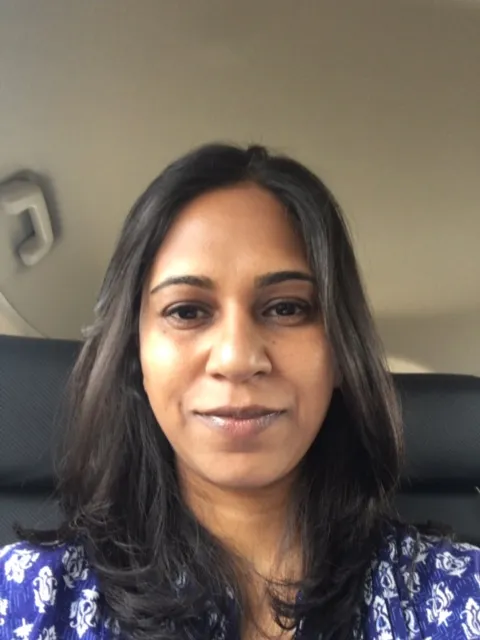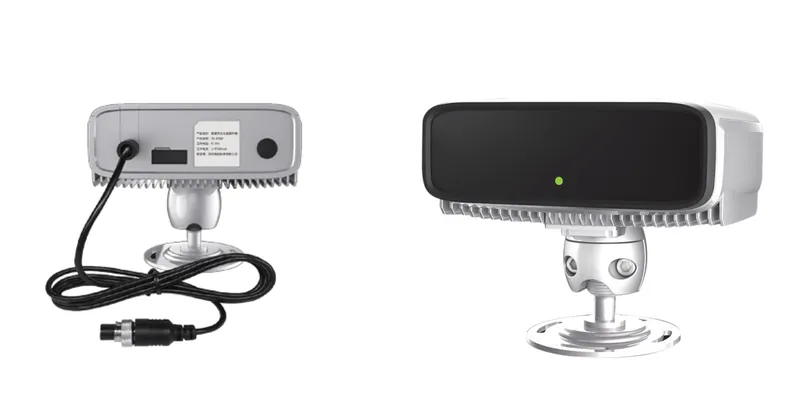Why this woman entrepreneur decided to start a dash cam business for Indian roads
Safe Cams is a Pune-based startup that manufactures and sells dash cameras to help reduce fatalities and accidents on the roads.
Growing up in Johannesburg, South Africa, Chetna Naidoo was used to driving in non-chaotic conditions. A well-organised road network and structured traffic was something she always took for granted.
However, in 2017, when she moved to Pune, India, along with her husband Vanesh Naidoo and two young children, she was in for a rude surprise. The unpredictable traffic conditions and a personal incident affected her to such an extent that it propelled her to do something about it.
And even as Chetna was getting a grip on her new life in India, she decided to launch Safe Cams, a Pune-based technology company, to help reduce accidents and fatalities on roads.

Chetna Naidoo
Driving hazard
“For me, the biggest challenge when I moved to India was driving, especially in Pune, where I found it to be dangerous and highly confusing. My worst experience was when I had once taken my kids for an outing on my own, and had to face my most dreaded moment on the road! We got involved in a minor accident, and very quickly a large crowd gathered around us,” recollects Chetna.
Much to her dismay, when she got out of the car to look at the damages, the crowd started blaming her. “I felt uncomfortable, and decided the best choice was to stay locked in my car with the kids until help arrived. This “minor incident” actually took several hours to resolve,” she recalls.
The whole experience got Chetna fervently looking at ways to be safe while on the road, and she soon purchased a dash camera from the UK, as this was not available in India at the time.
The dash cam that helped
“My friends and family in India started showing interest in our new device. This is when we had the idea to supply dash cameras in India, by developing our own local brand,” she explains.
And in 2018, Chetna and her husband founded Safe Camera Digital Eye Solutions (SCDE).
Commenting on a recent statement from the Union Road Transport and Highways Minister, Chetna points to an alarming statistic - Indian roads on an average witnesses 1 death every 4 minutes.
A World Bank Report in 2020 said that India accounts for 11 percent of global road accident victims, while having only 1 percent of the world’s vehicles.
“India has recently amended the Motor Vehicle Act to allow for tighter control over offenders on the road. However, the implementation of this can be incredibly challenging especially with the number of road users. Using CCTV and dash cameras at scale can provide proper law enforcement with video evidence of traffic violations, to identify number plates and issue fines to the registered driver of the vehicle,” says Chetna.

Safe Cams products
Building the monitors
At Safe Cams, the mission and aim is to help decrease the number of fatalities on roads. To that end, the team has introduced Driver State Monitor (DSM) and Advance Driver Assistance System (ADAS) cameras in India.
A DSM is a novel dash camera that uses advanced AI algorithms to prevent accidents before they occur. These dash cams continuously observe and monitor the driver’s face, and can detect in just a couple of seconds if the driver is not paying attention to the road ahead, tending to fall asleep, or displaying inattentive behaviour.
It then alerts the driver, so that his/her concentration can be refocused on the road. On the other hand, the ADAS is a forward collision warning system that alerts the driver to brake/slow down immediately if it is too close to a vehicle or object in front of it. This is another example of an advanced AI algorithm that is constantly calculating the distance and speed of the object in front of the vehicle, based on the video footage obtained from the dash cam.
“At Safe Cams, we are also proud to have supplied and installed the DSM system in police vehicles in the Dombivli-Kalyan Smart City, where the video footage (from our cameras) will allow the police to be able to issue challans to road offenders,” says Chetna.
The team works with vendors and suppliers across different parts of the country and globe.
to manufacture and distribute these dash cameras.
“The greatest car safety devices like the seat belts, reverse cameras and ABS braking have all come through technological advancements. The next step is to add AI and sensors to safety devices so they can spot problems before they occur, and take corrective action to prevent an accident. Video analysis means one can have a vigilant ‘digital eye’ on the road that never sleeps or gets tired,” explains Chetna.
COVID-19 challenge
The main challenge the team faced however was during the COVID-19 outbreak. Being a startup during lockdowns means you have a complete shutdown of business but continue to incur all the costs. According to Chetna, many customers paused their purchases during lockdowns and this invariably affected the business.
“Even though we are seeing some ray of hope now (as the Covid situation in the country is improving), we are still fighting to overcome its impact. Operationally, we have had challenges in finding employees with the best skills/fit for the job. The skill sets required were quite difficult to search for and find, and so we ended up training our employees from scratch,” says Chetna.
She adds that they also spent a great deal of time on the research and development stage, as the team had to ensure that the dash camera specifications they wanted would work well on Indian roads, and ensure that they had a competitive product in terms of costing.
Safe Cams offers one-year warranty on all products, and customer support both prior and post purchase of products. Furthermore, they provide bespoke products to key customers, and are constantly striving to improve and grow.
Market
Apart from biggies like Google and Uber entering the self-drive and connected cars space, there are several Indian startups such as Netradyne focusing on road safety using an IoT device. The latter has recently raised $150 million in Series C funding led by SoftBank Vision Fund.
Safe Cams manufactures and distributes dash cams to car accessory dealers -- and they are currently looking for distributors in Tier 1 cities. Chetna says the company has moved away from online selling of the Y Series to physical stores as it enabled them to offer professional installation of the hardwire kit and SD card.
“We also sell online via our website, Amazon, Flipkart and GEM. For our DSM and 4G cameras, the hardware is sold upfront to the customer, and we provide Cloud access and storage as a monthly/yearly subscription/fee to use our platform,” says Chetna,
The consumer dash camera prices range from Rs. 7,399/- to Rs. 27,999/- , with a variety of features such as dual camera, hardwire kit, WiFi and Parking Guard. “All our dash cams also have Full High-Definition video and Ultra Wide-Angle Lens,” says Chetna.
“The advanced 4G cameras such as the DSM and ADAS are packaged specifically for our customers' requirements. Pricing for these will vary based on several factors including custom requirements of our customers,” she adds.
Future
“As the Director of Safe Cams, one of my recent tasks involved reviewing the business’ standard on quality and service parameters and getting the company’s quality management systems to be ISO 9001 certified by an IAS-accredited auditor, which has been completed successfully,” says Chetna.
Chetna remarks that technology is making it easier for more women to start their own businesses. But what is required is more encouragement from the government and private sectors in making loans available. She feels offering internships to more women so that they can get the required exposure and opportunities in the business world will also be beneficial.
“Slowly and gradually, we will start seeing more women becoming financially independent and thereby, empowering other women to achieve more. There are also many social stigmas that women in India face, which must be changed and challenged. I strongly believe that women can bring a hugely different perspective to the table, especially in the testosterone-filled auto sector,” concludes Chetna.
Edited by Anju Narayanan



![[100 Emerging Women Leaders] Why this lawyer decided to start a bicycle rental startup in Rajasthan](https://images.yourstory.com/cs/4/a9efa9c02dd911e9adc52d913c55075e/Image9ne8-1627821207607.jpg?fm=png&auto=format&h=100&w=100&crop=entropy&fit=crop)
![[100 Emerging Women Leaders] Meet Minu Margeret, who went from being an ultimate frisbee champion to building a D2C brand](https://images.yourstory.com/cs/4/a9efa9c02dd911e9adc52d913c55075e/Minu-1621608791376.jpg?fm=png&auto=format&h=100&w=100&crop=entropy&fit=crop)


![[100 Emerging Women Leaders] How this woman braved domestic violence and abuse to find her niche as a fitness trainer](https://images.yourstory.com/cs/4/a9efa9c02dd911e9adc52d913c55075e/Imagexxli-1627391299237.jpg?fm=png&auto=format&h=100&w=100&crop=entropy&fit=crop)




